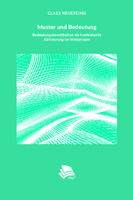Muster und Bedeutung
Bedeutungskonstitution als kontextuelle Aktivierung im Vektorraum
Abstract
The subject of this thesis is a computational linguistic model of Meaning Constitution in linguistic units. Taking the phenomenon of variability of linguistic meaning as its starting point, Meaning Constitution is described as an information-processing step, which is then implemented and empirically tested in a series of linguistic experiments. In this thesis, Meaning Constitution is understood as a dynamic process in which the meaning of linguistic units only becomes concrete within local contexts in relation to their general meaning potential. This dynamic concept of meaning is based on a central assumption of Cognitive Semantics, according to which meanings do not exist independently of the context. The motivation for the implementation of a computational linguistic model of its own is the fact that the conception of meaning in Cognitive Semantics itself does not involve such an operationalisation – which, strictly speaking, means that it must be regarded as not falsifiable.
Keywords
Meaning constitution; Semantic dynamics; Usage-based; Usage patterns; Distributional semantics; Computational-linguistic experimentsDOI
10.16994/bamISBN
9783946198406; 9783946198413; 9783946198420OCN
1100490068Publisher
Modern Academic PublishingPublisher website
https://www.humanities-map.net/Publication date and place
Cologne, 2019Classification
Semantics, discourse analysis, stylistics
Computational and corpus linguistics
Cognitive studies
Computing and Information Technology
Information technology: general topics


 Download
Download